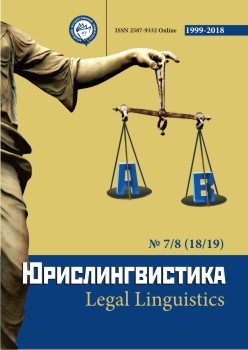THE TERM «ARTIFICIAL INTELLIGENCE» IN THE RUSSIAN LAW: DOCTRINAL ANALYSIS
Abstract
The article deals with the legal aspects of the use of artificial intelligence technology. The authors note a weak statutory regulation of the use of artificial intelligence in Russia, taking into account the active and widespread introduction of this technology in various spheres of life. Developments in the field of artificial intelligence raise very serious ethic and legal issues. Several legal issues, such as the nature of artificial intelligence, the existence of legal personality, the problem of liability for damage caused by artificial intelligence, the impact on the legal profession, etc., need to be addressed. Particular attention is paid to the need of developing a legal concept of artificial intelligence in order to build an effective model of legal regulation. The article analyzes approaches to the definition of artificial intelligence in special and legal literature. The use of such concepts as neural networks, machine learning, super intelligence, supercomputers is noted. Special attention is given to the attempts of legal definitions in South Korea and the European Union. According to the results of the study, the authors proposed the following features of artificial intelligence: the presence of a technical device or cyberphysical system; ability to receive, process and transfer information; ability to work autonomously; self-learning based on the analysis of information and experience; self-awareness; thinking and the ability to make independent decisions.
Downloads
Metrics
References
Архипов В. В., Наумов В. Б. Искусственный интеллект и автономные устройства в контексте права: о разработке первого в России закона о робототехнике. Труды СПИИРАН. 2017. № 6.
Бостром Н. Искусственный интеллект. Этапы. Угрозы. Стратегии. М., 2016.
Морхат П. М. Искусственный интеллект. Правовой взгляд. М., 2017.
Понкин А. В., Редькина А. И. Искусственный интеллект с точки зрения права. Вестник РУДН. Серия: Юридические науки. 2018. С. 91–109.
Aletras N., Tsarapatsanis D., Preoţiuc-Pietro D., Lampos V. Predicting Judicial Decisions of the European Court of Human Rights: A Natural Language Processing Perspective. Peer J Computer Science. URL: https://peerj.com/articles/cs-93/
REFERENCES
Arkhipov V. V. Naumov V. B. Artificial intelligence and autonomous devices in the context of the law: on the development of the first Russian law on robotics [Iskusstvennyy intellekt i avtonomnyye ustroystva v kontekste prava: o razrabotke pervogo v Rossii zakona o robototekhnike]. Proceedings of SPIIRAN. 2017. № 6.
Bostrom N. Artificial intelligence. Stages. Threats. Strategies [Iskusstvennyy intellekt. Etapy. Ugrozy. Strategii]. Moscow, 2016.
Morkhat P. M. Artificial intelligence. Legal view [Iskusstvennyy intellekt. Pravovoy vzglyad]. Moscow, 2017.
Ponkin A. V., Redkina A. I. Artificial intelligence from the point of view of law [Iskusstvennyy intellekt s tochki zreniya prava]. . Vestnik RUDN. Series: Legal Sciences. 2018. Pp. 91–109.
Aletras N., Tsarapatsanis D., Preoţiuc-Pietro D., Lampos V. Predicting Judicial Decisions of the European Court of Human Rights: A Natural Language Processing Perspective. Peer J Computer Science. URL: https://peerj.com/articles/cs-93/
Copyright (c) 2018 Антон Александрович Васильев, Дариуш Шпоппер, Майгуль Хафизовна матаева

This work is licensed under a Creative Commons Attribution 4.0 International License.
The authors, which are published in this journal, agree to the following conditions:
1. Authors retain the copyright to the work and transfer to the journal the right of the first publication along with the work, at the same time licensing it under the terms of the Creative Commons Attribution License, which allows others to distribute this work with the obligatory indication of the authorship of this work and a link to the original publication in this journal .
2. The authors retain the right to enter into separate, additional contractual agreements for the non-exclusive distribution of the version of the work published by this journal (for example, to place it in the university depository or to publish it in a book), with reference to the original publication in this journal.
3. Authors are allowed to post their work on the Internet (for example, in a university repository or on their personal website) before and during the review process of this journal, as this may lead to a productive discussion, as well as more links to this published work (See The Effect of Open Access).











